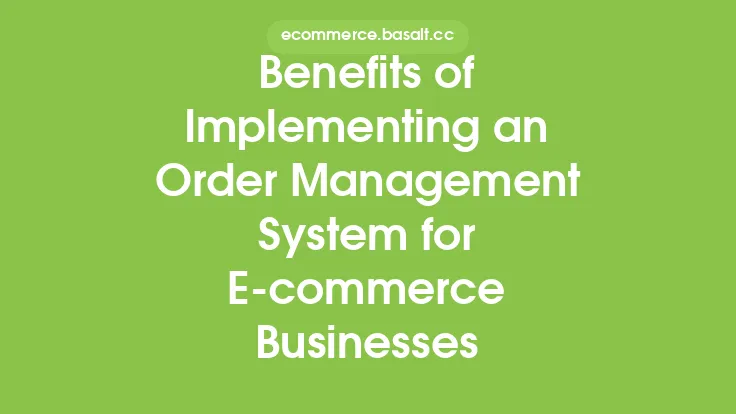As e-commerce businesses continue to grow and expand, they face numerous challenges in managing their orders, inventory, and shipping processes. One of the key factors that can make or break an e-commerce company's ability to scale and grow is its order management system. An effective order management system can help e-commerce businesses streamline their operations, improve efficiency, and enhance customer satisfaction. In this article, we will explore the impact of order management systems on e-commerce scalability and growth.
Introduction to E-commerce Scalability
E-commerce scalability refers to a company's ability to handle increased traffic, sales, and customer demand without compromising on performance, quality, or customer experience. As e-commerce businesses grow, they need to be able to scale their operations to meet the increasing demand. This includes managing orders, inventory, shipping, and customer service. A scalable e-commerce business is one that can adapt to changing market conditions, customer needs, and technological advancements without breaking down.
The Role of Order Management Systems in Scalability
Order management systems play a critical role in e-commerce scalability. They help businesses manage their orders, inventory, and shipping processes efficiently, allowing them to handle increased demand without compromising on performance. An effective order management system can help e-commerce businesses automate their order processing, reduce errors, and improve order fulfillment rates. This, in turn, can lead to increased customer satisfaction, reduced cart abandonment rates, and improved sales.
Key Benefits of Order Management Systems for Scalability
There are several key benefits of order management systems that can help e-commerce businesses scale and grow. These include:
- Automated order processing: Order management systems can automate the order processing workflow, reducing manual errors and improving efficiency.
- Real-time inventory management: Order management systems can provide real-time inventory updates, helping businesses avoid overselling and stockouts.
- Improved order fulfillment rates: Order management systems can help businesses improve their order fulfillment rates by automating the shipping and delivery process.
- Enhanced customer satisfaction: Order management systems can help businesses improve customer satisfaction by providing accurate and timely order updates.
How Order Management Systems Support Growth
Order management systems can support e-commerce growth in several ways. They can help businesses expand their product offerings, enter new markets, and improve their customer service. By automating the order processing workflow, order management systems can help businesses handle increased demand without compromising on performance. They can also provide real-time insights into sales, inventory, and customer behavior, helping businesses make informed decisions about their growth strategy.
Best Practices for Implementing an Order Management System
To get the most out of an order management system, e-commerce businesses should follow best practices for implementation. These include:
- Defining clear business goals and objectives: Businesses should define clear goals and objectives for their order management system, such as improving order fulfillment rates or reducing errors.
- Choosing the right order management system: Businesses should choose an order management system that meets their specific needs and requirements.
- Integrating the order management system with other e-commerce systems: Businesses should integrate their order management system with other e-commerce systems, such as their e-commerce platform, inventory management system, and shipping carrier.
- Providing training and support: Businesses should provide training and support to their staff to ensure they can use the order management system effectively.
Common Challenges and Solutions
E-commerce businesses may face several challenges when implementing an order management system. These include:
- Integration with existing systems: Businesses may struggle to integrate their order management system with existing e-commerce systems.
- Data migration: Businesses may struggle to migrate their data from an existing order management system to a new one.
- Training and support: Businesses may struggle to provide training and support to their staff.
- Scalability: Businesses may struggle to scale their order management system to meet increasing demand.
To overcome these challenges, businesses should work with an experienced implementation partner, provide comprehensive training and support to their staff, and choose an order management system that is scalable and flexible.
Conclusion
In conclusion, order management systems play a critical role in e-commerce scalability and growth. They help businesses manage their orders, inventory, and shipping processes efficiently, allowing them to handle increased demand without compromising on performance. By automating the order processing workflow, providing real-time inventory updates, and improving order fulfillment rates, order management systems can help e-commerce businesses improve customer satisfaction, reduce cart abandonment rates, and increase sales. To get the most out of an order management system, businesses should follow best practices for implementation, choose the right order management system, and provide training and support to their staff.





